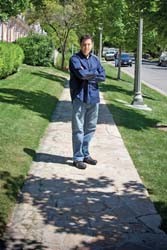Page 3 of 3
God and Politics
Perhaps Chaffetz’s most dramatic conversions occurred in Utah, discovering his faith and discovering his politics. While his father’s side of the family is Jewish, his mother was raised a Christian Scientist. Chaffetz’s parents taught their children right and wrong but weren’t religious.
Playing football in Utah, Chaffetz found himself ensconced in a hospitable LDS culture. Not a partier growing up, he found Mormonism’s teetotaling ways an easy fit. He met his wife through friends at school, and their early courtship was, in Mormon fashion, incredibly frugal. He took her to a taping of the 10 p.m. news at KUTV 2, where he worked on the weekends doing sports broadcasting.
“Michelle King was my superstar,” Chaffetz says. “She hung out with us afterward—that made me look good.” The second date, they went out for yogurt—Chaffetz had coupons.
Chaffetz admits he didn’t feel a lightning-bolt epiphany about faith, but he did feel comforted, through his soon-to-be wife and the culture in general. Ironically, he recognized the comfort as a feeling he experienced as a child in California, when a thunderstorm was raging outside. His parents were away, and his babysitter said a prayer. The calm Chaffetz felt then was a sensation he would rediscover in Utah.
“When I was just a little squirt, I don’t think I recognized the significance of that,” Chaffetz says. “Part of what happened at BYU is I became mature enough to actually humble myself and get on my knees and pray.”
Chaffetz’s time at BYU was marked by setting three placekicking records for the school, though he’s quick to admit his most important statistic was that his team never lost by the margin of one of his missed kicks.
After college, Chaffetz started working at Nu Skin as an intern and rose to hold various management positions—including in marketing and product development. During his 11 years there, he helped the fledgling multilevel marketing company grow into an international corporation.
While in Utah, Chaffetz gradually embraced conservative politics as he joined the dominant culture. Although Chaffetz grew up a Dukakis Democrat, due in part to his father having once been married to 1988 Democratic presidential candidate Michael Dukakis’ wife, Kitty, it was a prominent Utah family that helped bring him into conservative politics.
“My mother passed away in 1985. She died from breast cancer very young, [in her] early 50s.” Chaffetz says. “It was the same year the Huntsman family started the Huntsman Cancer Institute. I was very touched by that, and I paid more attention to it than most.”
Later, a mutual acquaintance introduced Chaffetz to the Huntsmans. One brief meeting turned into a minor campaign position on Huntsman Jr.’s 2003 gubernatorial campaign, which turned into managing the campaign and later Chaffetz’s appointment as then-Governor Huntsman’s chief of staff, where he fostered crucial relationships with members of the Legislature. A year and a half later, Chaffetz left the administration, but, he says, not because of any serious schism in the office. “Jon made it clear that is was time for a change,” Chaffetz says, “for him and for me.”
With experience running a statewide campaign and managing the governor’s office, Chaffetz felt ready to run for office himself. Rep. Chris Cannon, the 3rd District Republican, looked like a worthy adversary.

Chaffetz said it all came down to hard work. He was willing to work harder than others, and efficiently defeated Cannon with a small volunteer staff while spending less than $100,000. Chaffetz recalls one time getting three delegates to agree to meet him, but he had to get up at 5 a.m. to meet them in Richfield at 7:30 a.m.
“Just to meet three delegates,” Chaffetz says. “Most people don’t have it in their gut to do that. That’s fine. It just created another opportunity for me.”
Hound Dog
While Chaffetz displays a superhuman work ethic, part of his voter appeal is also his natural Joe Average-ness. Utah tea-party leader David Kirkham recalls first meeting Chaffetz at a Glenn Beck rally in 2009. When Chaffetz arrived, all the parking had been taken. Half-expecting Chaffetz to drive up to the stage like royalty, Kirkham says Chaffetz instead parked at a Walmart lot far from the event.
“In his pinstripe suit and wingtips, he walked all the way across this dirt field and came up to me and said, ‘Hi, I’m Congressman Chaffetz,’” Kirkham recalls. “We talked for some time, and it was like I was speaking to anyone else walking by.”
Chaffetz is also accessible to the media—so much so that Hatch recently called him a “publicity hound.” The Salt Lake Tribune’s D.C. correspondent Thomas Burr considers Chaffetz a “rarity” when it comes to press availability. “I swear, if I don’t call him every few days, he’ll call me to see if I need anything,” Burr says.
Not everyone is sold on Chaffetz’s efforts at transparency. Chaffetz constituent Joseph Puente once devoted an entire Website called JasonWatch.org to scrutinizing Chaffetz and his politics. Puente eventually campaigned as an independent against Chaffetz in 2010. After being easily defeated, Puente stopped following Chaffetz so closely.
Puente’s prognosis of his congressman is simple—narcissism. “People who gravitate to public positions often have narcissistic tendencies,” Puente says, citing himself as an example. When Puente ran for office, the Navy veteran posted on his Website his own “dirty laundry,” including a disorderly conduct charge Puente received in 2006 for an argument he had with staff at the local Veterans Affairs office.
“If people didn’t say things [Chaffetz] liked, he kicked them off his page,” Puente says. “A typical need for adulation.”
Puente recalls that when Chaffetz was a freshman, his online “Cotside Chat” videos used to allow users to leave comments until, Puente says, he started leaving critical comments. Puente says he was told by Chaffetz that Republican leaders had suggested the comments be closed.
“I looked at [other Republican lawmakers’ sites], and they have no problem with people leaving comments,” Puente says. Puente’s criticisms also got him booted from Chaffetz’s Facebook page. Chaffetz acknowledges blocking Puente for being “factually inaccurate, rude and condescending” to other commenters. But he says, overall, he’s blocked less than 10 people from Facebook. “I’ve always wanted to be as transparent as I possibly can be.”
Puente also says Chaffetz has long had designs on a Senate seat, pointing to a Website name secured in 2009 by Chaffetz’s Political Action Committee called “ChaffetzForSenate.com.” Chaffetz says the Website was acquired just to secure his domain rights from being taken by cybersquatters.
While Chaffetz has been lauded by pundits for being receptive to his constituents, Puente calls it dishonest politics. “Chaffetz feeds them their ideology, and they like him for it,” Puente says. “But if all you do is tell the people what they want to hear, you’re not being honest with them. Ultimately, it doesn’t serve the public good.”

It’s His Right
While City Weekly enjoyed unprecedented access to Chaffetz during a recent D.C. visit, an interview with Hatch was gained only after stumbling into him at the airport before boarding a flight home to Utah.
Hatch admits it’s possible for novice lawmakers to be effective on the Hill—he should know, because he did it when he was a freshman senator. “In my first two years, I led one of the most important fights in U.S. [labor-law reform] history. No one else was willing to take it on,” Hatch says of a labor battle he says was hard-fought and won by a single vote. “I was able to be effective right off the bat.”
In broad strokes, he sounds like he is describing Chaffetz himself when Hatch talks about his unpopular battles as an upstart newbie on the Hill. Hatch is quick to point out that he’s still got the conservative chops for Utah. “As long as people support me, they will have a very active and strong personality in Washington,” Hatch says. “I’m considered one of the top conservatives in the country—I’m not saying that myself—but I got about a 97 percent conservative voting record.”
In regard to Chaffetz’s troop-withdrawal amendment, Hatch finds it interesting who supported that amendment. “He has a right to do that, but you know you look at the people who supported it, and it’s the far left,” Hatch says. As for the question of his impressions of the possibility of the young Turk seeking Hatch’s own seat, he repeats drolly that it’s his call.
“I prefer that he didn’t. Personally, I’d never run against a fellow Republican,” Hatch says with simple resignation. “But that’s his right.”
While Chaffetz says he will make no official announcement on any Senate aspirations until after Labor Day, he does find humor with Hatch’s concern about the perils of Utah having two freshman senators from Utah (Mike Lee ousted Bob Bennett from his Senate seat in 2010).
“He didn’t feel that way in ’74 and ’76 when [Jake] Garn and [he] were two freshmen,” Chaffetz says. “In fact, I think some of the best work he did was back in those years.”
